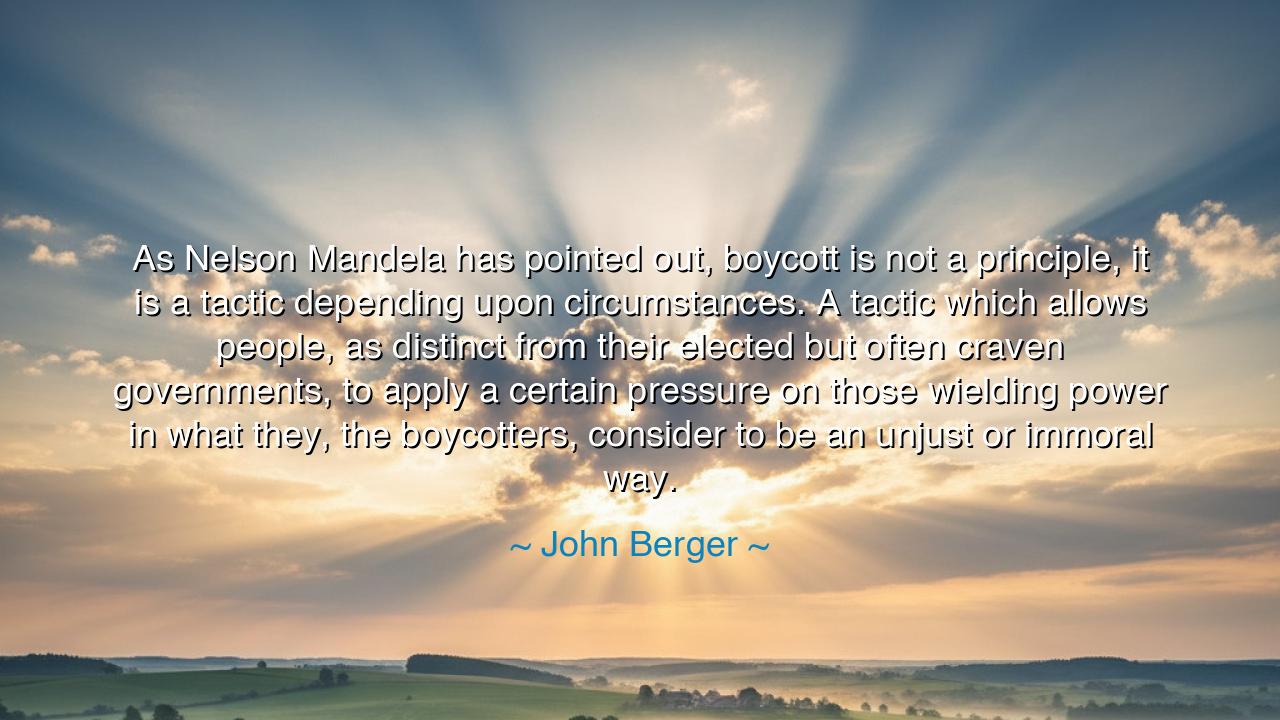
As Nelson Mandela has pointed out, boycott is not a principle
As Nelson Mandela has pointed out, boycott is not a principle, it is a tactic depending upon circumstances. A tactic which allows people, as distinct from their elected but often craven governments, to apply a certain pressure on those wielding power in what they, the boycotters, consider to be an unjust or immoral way.






Hearken, O children of discernment, to the counsel of John Berger, who reflects upon the nature of boycott as a tool of justice. He reminds us, invoking the wisdom of Nelson Mandela, that boycott is not a principle unto itself, but a tactic, chosen according to circumstances and guided by conscience. Here lies a teaching for the ages: the oppressed and the aware possess means to exert influence beyond the structures of official power, and the application of these means must be both thoughtful and purposeful.
The origin of this reflection is rooted in Berger’s life as a writer and thinker, observing the struggles of peoples under oppression, and the dynamics between governments and the governed. Mandela himself illuminated the strategic value of boycotts during the struggle against apartheid, demonstrating that collective action by the people—distinct from often craven governments—can exert meaningful pressure upon those who wield authority unjustly. Berger interprets this lesson for all generations: moral action often requires discernment, timing, and strategic choice.
The meaning of this aphorism is profound: a boycott is not an end in itself, but a lever of justice, a means to awaken conscience and impose consequences upon those who perpetuate injustice. It reminds mortals that power is not absolute, and that even those without formal authority can influence the course of events when acting collectively and ethically. To act without principle, however, or without discernment, is to wield force ineffectively; to act wisely is to align moral conviction with strategy.
History provides living testament to this teaching. Consider the global boycott of South African goods during apartheid. Individuals and communities around the world, motivated by conscience, withheld participation in trade, culture, and sport, sending a clear message to the oppressors. Though governments were often hesitant or silent, the collective action of ordinary people applied a moral pressure that contributed to the dismantling of systemic injustice. Here, Berger’s insight—Mandela’s tactical wisdom—was made manifest.
Moreover, this principle extends beyond nations to all spheres of human endeavor. When communities, guilds, or collectives recognize an unjust power, they may choose deliberate action—whether through withdrawal of support, protest, or advocacy—to guide behavior toward righteousness. A tactic, grounded in ethics, can awaken reflection, compel change, and remind those in authority that moral legitimacy rests upon justice, not mere control.
O generations yet unborn, take this counsel into your hearts: recognize the distinction between principle and tactic, and wield each with wisdom. Employ boycotts, protests, and collective action not for vanity, but as instruments of conscience, aiming to correct injustice where power falters. For in the careful application of pressure, the people assert their moral authority, and through this, the arc of history bends toward justice, guided by the steadfast courage of those who dare to act rightly.






NNDao Ngoc Nhi
I’m curious about the broader implications of viewing boycotts as tactics rather than principles. Does this approach encourage flexibility and pragmatism in activism, or could it lead to inconsistent application of moral standards? How do organizers communicate their reasoning to maintain public support, especially when governments fail to act? It also makes me reflect on the role of individual choice: how do personal values intersect with collective strategies in determining when and how to apply pressure through boycotts?
XT32_11A1_DTM Le Xuan Thang
This statement prompts me to think about the tension between moral responsibility and practical strategy. If boycotts are context-dependent tactics, how do activists ensure they target the right entities and avoid harming innocents? I also wonder about historical examples: which boycotts have succeeded, and what factors—public awareness, economic leverage, media attention—made them effective? This raises broader questions about the interplay between grassroots action and institutional authority in driving social change.
Zzumy
Reading this, I’m intrigued by the idea that boycotts rely on collective judgment about injustice. How do groups decide what constitutes an 'unjust or immoral' action, and how much consensus is necessary for a boycott to be legitimate? It also raises questions about the limits of citizen power: can boycotts alone effect meaningful change, or are they most powerful when combined with other forms of advocacy, legal action, or international pressure?
MLNguyen Mai Linh
I find this perspective interesting because it frames boycotts as a form of pressure independent of government action. Does this mean that civil society can play a more decisive role than official policy in shaping justice and accountability? I also question whether boycotts are most effective in democratic societies, where public opinion matters, or if they can have impact under more authoritarian regimes. How do organizers measure success and avoid unintended consequences?
LA1.Nguyen Ngoc Lan Anh
This quote makes me reflect on the strategic nature of political activism. If a boycott is a tactic rather than a principle, how do activists determine when it is appropriate or likely to be effective? I also wonder about the ethical implications: can using a boycott inadvertently harm those who are not responsible for the injustice? How do movements balance moral urgency with the practical consequences of their chosen tactics?